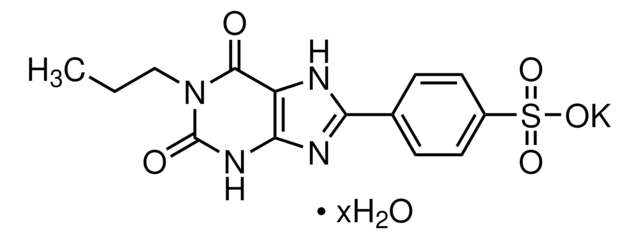M6316
MRS 1754 hydrate
≥98% (HPLC), solid
Synonym(s):
8-[4-[((4-Cyanophenyl)carbamoylmethyl)oxy]phenyl]-1,3-di(n-propyl)xanthine hydrate
About This Item
Recommended Products
Assay
≥98% (HPLC)
form
solid
color
off-white
solubility
DMSO: soluble >10 mg/mL
storage temp.
room temp
SMILES string
O.CCCN1C(=O)N(CCC)c2[nH]c(nc2C1=O)-c3ccc(OCC(=O)Nc4ccc(cc4)C#N)cc3
InChI
1S/C26H26N6O4.H2O/c1-3-13-31-24-22(25(34)32(14-4-2)26(31)35)29-23(30-24)18-7-11-20(12-8-18)36-16-21(33)28-19-9-5-17(15-27)6-10-19;/h5-12H,3-4,13-14,16H2,1-2H3,(H,28,33)(H,29,30);1H2
InChI key
ZACJDWOPQROWIK-UHFFFAOYSA-N
Gene Information
human ... ADORA1(134) , ADORA2A(135) , ADORA2B(136) , ADORA3(140)
rat ... Adora1(29290) , Adora2a(25369) , Adora2b(29316)
Application
- to study its effects on endothelial nitric oxide synthase (eNOS) phosphorylation induced by short-term acetate stimulation in human umbilical vein endothelial cells (HUVECs)
- blastema formation in zebrafish
- to serve as a positive control in the anti-sickling assay and to study the role of RA2B in the same
Biochem/physiol Actions
Features and Benefits
Legal Information
Storage Class Code
11 - Combustible Solids
WGK
WGK 3
Flash Point(F)
Not applicable
Flash Point(C)
Not applicable
Personal Protective Equipment
Regulatory Listings
Regulatory Listings are mainly provided for chemical products. Only limited information can be provided here for non-chemical products. No entry means none of the components are listed. It is the user’s obligation to ensure the safe and legal use of the product.
PDSCL
Deleterious substance
JAN Code
M6316-BULK:
M6316-5MG:4548173203188
M6316-25MG:4548173203171
M6316-VAR:
Certificates of Analysis (COA)
Search for Certificates of Analysis (COA) by entering the products Lot/Batch Number. Lot and Batch Numbers can be found on a product’s label following the words ‘Lot’ or ‘Batch’.
Already Own This Product?
Find documentation for the products that you have recently purchased in the Document Library.
Customers Also Viewed
Our team of scientists has experience in all areas of research including Life Science, Material Science, Chemical Synthesis, Chromatography, Analytical and many others.
Contact Technical Service









